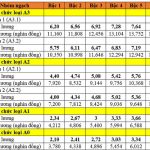On July 21, 2024, the Politburo issued Conclusion 83-KL/TW, which outlined a roadmap for salary reform and adjustments to pensions, social insurance allowances, preferential treatments for revolutionary contributors, and social allowances, effective July 1, 2024. The following are seven key policies regarding the salaries of officials, civil servants, and public employees:

From July 1, 2024, monthly salaries and additional income will be calculated based on the new basic salary of VND 2.34 million per month, following a special mechanism.
1. Adjust the basic salary from VND 1.8 million to VND 2.34 million (a 30% increase) effective July 1, 2024.
2. Implement a bonus scheme from July 1, 2024, with a bonus fund equivalent to 10% of the basic salary fund.
The bonus scheme is linked to the responsibility of the head of the agency or unit in evaluating and ranking the performance of salary recipients. It aims to motivate and incentivize officials, civil servants, public employees, and armed forces to improve their work quality and effectiveness, thereby enhancing the efficiency of the political system. This scheme should not overlap with the regulations of the Law on Emulation and Rewards 2022.
3. Improve the salary promotion scheme to align with the transition to a new management and salary payment system for officials, civil servants, public employees, and armed forces.
4. Clearly define and guide the use of five sources of funding for salary schemes:
– Surplus funds from local budget increases and unspent funds allocated for salary reforms in previous years.
– Central government budget.
– A portion of service revenue and 10% of additional regular expenditure savings.
– Funds from personnel streamlining.
5. Improve the salary and income management mechanism by providing clear guidance on four aspects:
– The authority and responsibility of the head of the agency or unit in evaluating and ranking officials, civil servants, and public employees for salary and bonus payments, as well as their performance in carrying out tasks.
– The authority of the head of the agency or unit to use the salary fund and regular expenditure budget to hire experts, scientists, and talented individuals to perform the tasks of the agency or unit, and to decide on income payments linked to assigned tasks.
– Expand the pilot program for additional salaries in some localities that meet the conditions stipulated in Resolution 27/NQ-TW of 2018.
– A salary and income management mechanism that aligns with the state budget allocation and revenue sources of public service units.
6. Implement salary and income schemes for agencies and units currently applying special financial and income mechanisms:
The Party Committee of the Government is tasked with directing the Government, ministries, and relevant agencies to thoroughly review the legal framework and propose amendments or abolitions of special financial and income mechanisms for certain agencies and units. They should also ensure the preservation of the difference between salaries and additional income received in June 2024 and those received after the amendments or abolitions of these mechanisms.

From July 1, 2024, officials, civil servants, and public employees who are eligible will continue to receive seniority allowances.
During the transition period before the amendments or abolitions, the following will be implemented: From July 1, 2024, the monthly salary and additional income will be calculated based on the new basic salary of VND 2.34 million per month, following a special mechanism, ensuring that the total amount does not exceed the salary and additional income received in June 2024.
7. Amend and supplement some allowance regimes:
The Party Committee of the Government will lead and direct the research and decision-making process for amending and supplementing the allowance regime and special policies for the armed forces, as well as the allowances for officials, civil servants, and public employees in certain specialized fields, especially those related to professions where implementation has led to unreasonable situations.
The implementation of salary reforms under Resolution 27/NQ-TW of 2018 for officials, civil servants, public employees, and armed forces has faced numerous difficulties, obstacles, and inconsistencies. Therefore, it is necessary to thoroughly and comprehensively review and study this process and make appropriate amendments to the regulations of the Party and the laws of the State. Subsequently, these amendments will be submitted to the Central Committee for consideration and adjustment of certain contents of Resolution 27/NQ-TW of 2018 to align with practical situations.
As a result, the implementation of salary reforms under Resolution 27/NQ-TW of 2018 has been temporarily postponed, and the content regarding the implementation of salary policies from July 1, 2024, does not mention the elimination of seniority allowances.
Therefore, from July 1, 2024, officials, civil servants, and public employees who are eligible will continue to receive seniority allowances.
Minister of Internal Affairs on salary policy reform and administrative unit arrangement
In 2024, the Ministry of Interior continues to advise on decentralization and delegation of authority, emphasizing the reorganization of the administrative apparatus. It proposes to the competent authorities the synchronized, unified, comprehensive, and effective implementation of wage policy reforms starting from July 1, 2024.
Salary of civil servants and officials before and after salary reform
Starting from July 1st, public servants and officials will have a new salary scale based on their job positions, titles, and leadership positions, replacing the current salary scale.
Higher wages in education and healthcare industries compared to the average rate
According to Minister Pham Thi Thanh Tra, when implementing salary reform, the salaries of education and healthcare civil servants will be higher than the general level of the civil servant and other staff, because we are implementing salary policy reform linked to the implementation of the resolution on fundamental and comprehensive education and training development, healthcare.










































